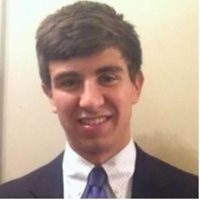David Schaffer

Originally from Boone, NC and a graduate of Georgetown University, David is now a second-year medical student at the University of North Carolina at Chapel Hill. He has a longstanding interest in Chinese language and culture, and hopes to combine these interests with his studies of medicine and public health.
As a Kean Fellow, David evaluated how crowdsourcing methods can increase community engagement and generate innovative public health interventions in South China. His other interests include teaching, tennis, and playing music.

Project: "Clinical Management of Serofast Syphilis Patients in South China"
June 1, 2015 - July 18, 2015
China
What does the Kean Fellowship mean to you?
The Kean Fellowship offered a chance to combine my studies in medicine and public health with a longstanding interest in Chinese culture, history and language. Without support as a Kean Fellow, my work in Guangzhou, China would not have been possible, and I am very grateful to have been part of a fellowship program that offered me the chance to research a unique topic in an equally unique part of the world.
What do you anticipate learning?
My work in Guangzhou, China offered a glimpse of how medical and public health workers can impact developing regions in Southeast Asia. Working in a hospital in Guangzhou, I was able to see the clinical correlates of the large scale public health interventions we were working to implement--quickly recognizing the value of a public health campaign that, in other areas of the world, may have had no utility. The Chinese healthcare kindles a clinical atmosphere that shares few similarities with what I have experienced in an American hospital and medical school; with this experience in Guangzhou, I took away a sense of how my future work in China will need to not only account for the unique public health issues of the region, but also for the political and cultural details that shape everyday life in Chinese clinical settings. I am excited about continuing to narrow the scope of my interests in medicine and public health, and owe my gratitude to the Kean Fellowship program for helping me take a large step in that direction. I anticipate that my experience in Guangzhou, China will serve as a scaffold for my future research or clinical work in the next several years.
What interests you about tropical medicine and what problems are you interested in solving?
My current interests lie with understanding how community engagement can foster public health outcomes in developing regions. In Guangzhou, sexual health is ironically both a critical public health issue and a socially “uncomfortable” topic. My work seeks to evaluate how principles such as crowdsourcing or social entrepreneurship can engage individuals and organizations to recognize, discuss, or help solve health issues in their region. In my experience, tropical medicine connotes medical issues that are uniquely shaped by the sociocultural, political, and environmental factors of the endemic tropical area; my work thus far has sought to tackle these sociocultural factors influencing these public health issues; specifically, I hope that my future work will continue to help identify how crowdsourcing and social entrepreneurship can animate marginalized or disengaged populations to undertake public health challenges, generating community engagement and innovative public health solutions in the process. As only second year medical student, I am excited to continue research on my current project and see what future opportunities may let me contribute to tropical medicine and public health efforts in Southeast Asia.